In signing the Book of Commitment George paid tribute to the extraordinary men and women who having survived the Holocaust, work to educate young people about what they endured, through the Holocaust Educational Trust’s Outreach programme.
In the weeks around Holocaust Memorial Day, thousands of commemorative events will be arranged by schools, faith groups and community organisations across the country, remembering all the victims of the Holocaust and subsequent genocides. This year, people will also be encouraged to take a stand against racism and prejudice today – and to speak out against hatred wherever they encounter it.
George said:
“Holocaust Memorial Day marks the anniversary of the liberation of Auschwitz-Birkenau – and is an important opportunity to both remember the victims of genocide. I encourage all constituents to mark the day and to commit to ‘speaking up and speaking out’ against prejudice today.”
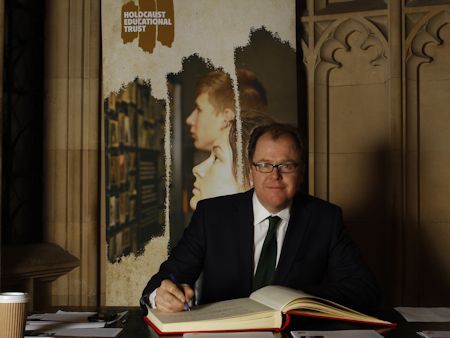
The event discussed how best to establish better rules on banking practice, and to clear avenues for lending and banking relationships with small businesses.
Speaking after the event George Freeman said:
“Banks continue to receive widespread criticism for the substantial bonuses they continue to pay themselves. What we want is to see them step up lending, particularly to small and medium-sized businesses. Quite simply, the banks need to live up to their side of the bargain. Small businesses are the lifeblood of our economy and it is wrong for bankers in London to forget that.”
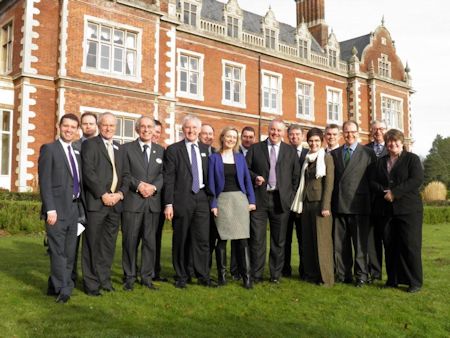
Despite Cranswick Norfolk being one of the largest pork processors in the United Kingdom, representing both household and gourmet brands such as Sainsbury’s, Tesco’s Finest, Jamie Oliver, Simply Sausages, and Weight Watchers, and having coveted US Department of Agriculture (USDA) approval, the plant has been refused export rights by the Foods Standards Agency (FSA) to the Far East on health and safety grounds.
Commenting after his visit on this discrepancy George Freeman said:
“Cranswick Norfolk is one of Europe’s premier pork butchery facilities and together with its group companies across the UK it has won multiple food industry awards. It is one of the biggest employers in Mid Norfolk with 900 staff, recently benefitting from a further £12 million in investment, and as I saw from my visit they hold the importance of health and safety and hygiene exceptionally highly.
The rising average income in countries like China in the Far East are opening up huge markets for the UK, with particular demand in China for what is called the ‘5th Quarter’ – effectively the parts we do not even commonly eat here in the UK. Agriculture and Farming are of major growth potential to Norfolk and it strikes me as ridiculous for the FSA to hinder growth to a company that already represents brands like Jamie Oliver. Red tape madness is not the way for us to create a sustainable recovery.
After discussing the issue with Chief Operating Officer, Adam Couch, and Site Managing Director, Chris Aldersley, I have decided to endorse the points raised by Graham Stuart MP in the House by writing to the Prime Minister and the Department for Environment, Food and Rural Affairs. I shall also be inviting the FSA Director to meet with me to see a solution can be found.”
| EDP
Hansard text of Prime Minister’s Questions 11/01/2012
Cranswick plc
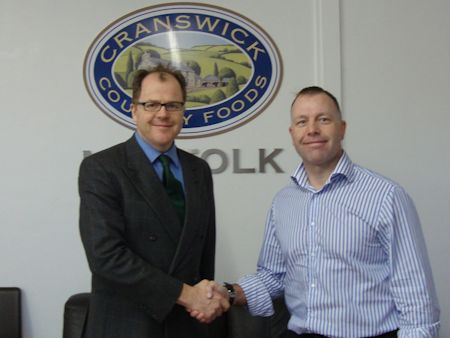
After £30m of public funding was secured to improve the county’s broadband, it is now up to the people of Norfolk to prove the demand which will attract private investment.
The right bidder will only come forward if Norfolk can convince them there is enough demand to make the scheme viable – which is where your help is vitally needed.
The EDP has teamed up with Norfolk County Council to launch the Say Yes to Better Broadband campaign aiming to generate a “critical mass” of interest from every section of society.
Today the council launched a demand registration website to collect details from tens of thousands of individual users before the procurement process begins in April.
Campaigners are urging the whole of Norfolk’s population to help the project team’s ambitions to unlock broadband speeds of 30Mbps (megabits per second) for as many people as possible – and provide a minimum standard of 2Mbps for all.
That will instantly make it possible for families to speed up basic tasks like shopping, banking, entertainment and conversation – as well as providing a network capable of dealing with the technological advances of the future.
You can register your interest in superfast broadband through the county council’s new website from Wednesday.
Norfolk County Council Broadband page: http://www.norfolk.gov.uk/Council_and_democracy/Online_services/NCC093425

Despite the Department of Transport committing an extra £10 million for community transport in rural areas, the disproportionately high casualty rates on country roads mean walking to school is not a safe or realistic option for many rural families.
Speaking in the debate George raised the issue of rural discrimination, and changing traffic and work patterns, to call for a review to current free school transport criteria, also highlighting the issue of school pupil safety and the importance of school bus services in making the school commute convenient, safe and affordable for families in Mid Norfolk.
Commenting after the debate George said:
“It is simply not fair to rely on rural families to drive children to school. This is expensive, bad for the environment and personal health, causes congestion, and is simply impossible for many single parents and working families. We all understand the pressure on public finances, and cuts to school buses may be feasible in cities, but not in the rural UK.
We want to be promoting walking and cycling, but this cannot be done without being sure that the routes we will be sending our children off on are safe and well lit. Wandering down dark country lanes without a footpath is not an option and the Departments for Transport and Education need to make sure rural schools are treated fairly. In the past there has been too much passing the buck of responsibility.
Norfolk County Council currently transports 24,000 children to school per day who fit the current criteria for school transport, but many more thousands are forced to walk round trips of up to four miles per day along unlit country roads without footpaths. This legislation remains virtually unchanged since the 1940s and is simply out of date. It does not fit with today’s lifestyle, is unsafe, and unfair on rural areas. Living in the country is different. One size does not fit all.
Transport to school is a major challenge facing rural areas and getting this right is crucial to allow Mid Norfolk to remain a place where families want to live, work and raise children. I recently visited Wymondham College to meet with teachers, parents and Morley Saint Botolph village residents who are campaigning for a footpath for school children in their area. Together they reiterated to me just how pressing this issue is for families in rural Norfolk and I am pleased to have been able to discuss this in the House.”
FULL TEXT:
George Freeman (Mid Norfolk) (Con): Does my hon. Friend agree that at the heart of the question is the issue of one size not fitting all, and legislation not working in rural areas in the same way that it does in urban ones? In cities, many of us will have seen happy gangs of schoolchildren walking and cycling safely to school in a morning. In rural areas, increasingly both members of couples are working, and at rush hour families who commute are affected by the cost of fuel and the higher speed of traffic. There is much more traffic on rural roads, and many people in mid-Norfolk live more than two or three miles from a local school. School rush hour in rural areas is a real problem. Norfolk now provides 24,000 free journeys a day, which has been described as the tip of the iceberg. That is a problem across rural areas, and I urge the Minister to see whether the criteria can be reviewed to take account of the important change that has taken place in the past 40 years.
| Hansard

Speaking at Fakenham Racecourse at the Boxing Day Meet of the West Norfolk Fox Hounds, England’s oldest pack, George, whose father Arthur rode for HM The Queen Mother in the 1950’s and won the 1958 Grand National on Mr What, made the case for a detailed Parliamentary Enquiry into the impact of the 2005 Hunting Ban before a vote on Repeal. Highlighting the importance of Hunting to the viability of National Hunt racing and the wider rural economy, as well as to rural communities and rural heritage, Mr Freeman described the Hunting Ban as an ‘Act of ignorance and intolerance which stains the reputation of Parliament”.
George Freeman said:
“The annual Boxing Day meet is a part of our national heritage. Tens of thousands of people across Britain – from the upland Fell packs to the West Norfolk here today – showed their support for their local hunts. Through their employment of people in often remote areas, their membership and events, support for Pony Clubs and the wider equestrian economy, local hunts play a vital role in the rural economy. Horseracing in particular is dependent on the hunts for the network of Point to Points which underpin National Hunt Racing. I was proud to be at Fakenham racecourse as the son of a jockey and grandson of a huntsman, to highlight the importance of local hunts to racing and rural communities.
Hunts are only surviving because the Ban passed by Tony Blair is unenforceable. Their survival is fragile and unsustainable. The Ban is having a hugely damaging impact. At a time when we need all the jobs and growth we can get, we should repeal the Ban and bring hunting back within a new regulatory Code of Conduct for Country sports and with proper evidence based monitoring of the many and various animal welfare and environmental impacts of hunts.
I am pleased that the Coalition Government has committed to a free vote on the ban in its Coalition Agreement. But before we have that vote let’s set up a Parliamentary Committee of Enquiry to find out what effect the Ban is really having. All the anecdotal evidence is that the Ban is bad for animal welfare, bad for the countryside, bad for the rural economy and a waste of police resources. Let’s look at the evidence properly so we can decide on Repeal on the basis of the facts rather than political bigotry and class war against the countryside.”
Press Coverage:
EDP Norfolk MP calls for review of Hunting Ban, as thousands attend Boxing Day meets
Telegraph Record numbers turn out for Boxing Day hunt after boost for campaign to overturn ban
Guardian Fox-hunting ban: call for repeal gets lukewarm response
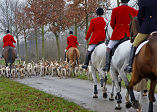
There were emotional scenes on the final day as many loyal customers thanked staff for their service over the years with George accepting a petition from residents in support of local shops.
Speaking about the closure George said:
“The increasing trend of national chains dominating our high streets and the loss of historic shops undermines our sense of local identity. I will take this petition as an opportunity to feed into the district council’s consultation on the importance of historic shops in our high street.”
EDP coverage of the closure
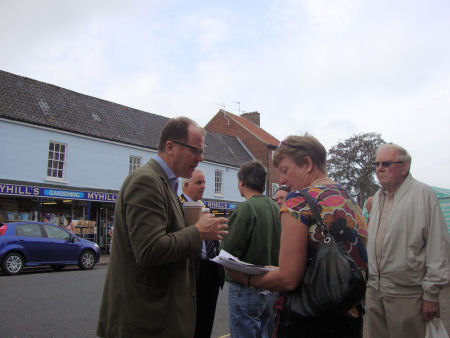
Before Christmas George joined Head Teacher Karin Heap, staff, pupils and parents for the end of year Christmas Assembly at Chapel Road Special School.
George handing out the end of year certificates and stayed on after the assembly to chat with children and visit classes.
It’s been a big year for Chapel Road with a visit from the Secretary of State for Education and a move to Wymondham College in the pipeline. This was a great end to the year.
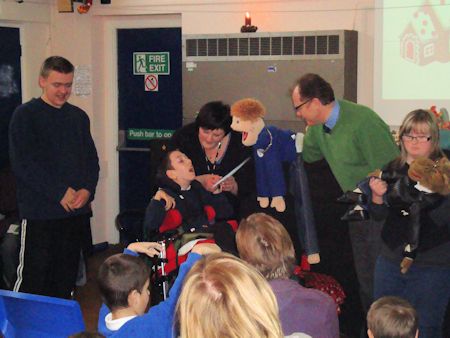
The summit looked at the pressures facing the Norwich and East Anglia rail networks, with each MP leading on a different issue.
George said:
“By gathering together the key stakeholders this summit provided us with a great opportunity to set out our vision for the next 25 years of Eastern rail. It was a productive session and provided the chance to set out my case for improvements to the Norwich-Cambridge line. By increasing the line’s speed and frequency we can unlock the full economic potential of our world class science research facilities and businesses which make up the Norwich-Cambridge innovation corridor.
“We also had time to discuss the importance of our community and heritage lines which are so vital to the character of our region which followed up points raised during successful meeting with Abellio earlier in the month when I spoke about the role of station improvements to Wymondham to maintain its heritage and the town’s picturesque tourism appeal.”
EDP: MPs and business leaders gather for East Anglia rail summit
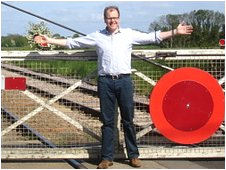
The Forum, which meets quarterly throughout the year, has a membership of over 50 businesses and provides an opportunity for networking and to raise questions about business issues facing the area for local entrepreneurs and Council Leaders.
Speaking about the event, George Freeman said:
“The ASBF Christmas lunch presented a great opportunity to discuss the findings of the national Portas Review published this week, whilst also looking at the specific challenges facing our local businesses. It is crucial for growth for local business leaders to ‘have an ear’ and be able to share experience for the good of the whole community. The ASBF is following in the steps of similar successful forums in Broadland, Thetford and South Norfolk, and I enjoyed taking part.”
Current ASBF Members:
http://www.brecklanddirectory.co.uk/Content/Business-Centre/Attleborough-and-Snetterton-Business-Forum

